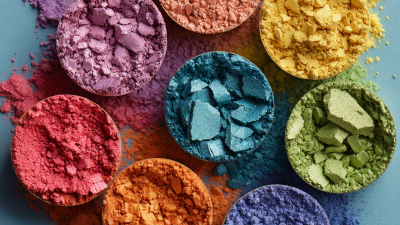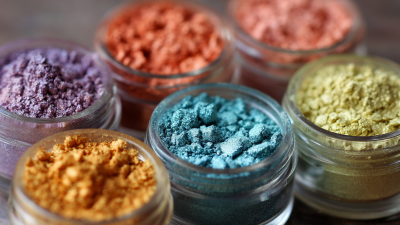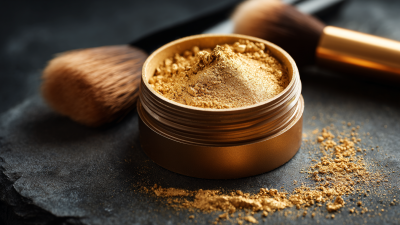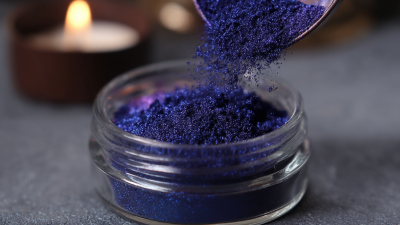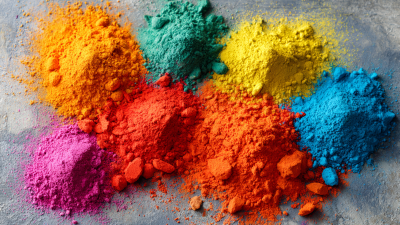In the ever-evolving beauty industry, consumers are increasingly seeking makeup options that not only enhance their appearance but also prioritize skin health. Mica Powder Makeup has gained significant attention as a natural alternative, often praised for its lightweight texture and luminous finish. According to a report by Grand View Research, the global natural makeup market was valued at over $6 billion in 2022 and is expected to grow, driven by the demand for cleaner cosmetic formulations.

Mica, a naturally occurring mineral, is frequently used in powders and pigments, offering a shimmering effect while being gentler on the skin compared to traditional makeup, which may contain synthetic additives and preservatives. This shift towards natural cosmetics prompts a crucial comparison: is Mica Powder Makeup truly better for your skin than its conventional counterparts? In this guide, we will delve into the benefits and drawbacks of both options to help you make an informed decision.
Mica powder makeup has gained popularity in recent years, not just for its aesthetic appeal but also for its skin benefits. Unlike traditional makeup that may contain synthetic ingredients, mica powder is a natural mineral that provides a shimmering finish without clogging pores. This natural mineral helps to reflect light, giving the skin a radiant glow while being gentle on sensitive skin types. Moreover, it is often free of harsh chemicals like parabens and heavy fragrances, making it a safer option for daily wear.
In addition to its cosmetic advantages, mica powder has several skin-friendly properties. It is known for its ability to absorb excess oil, which can be particularly beneficial for those with oily or combination skin. Furthermore, mica is often enriched with other beneficial minerals, promoting a smoother complexion and enhancing skin’s texture. With its lightweight formula, mica powder allows the skin to breathe, reducing the risk of breakouts while providing a naturally beautiful finish that enhances the skin's own luminosity.

Traditional makeup products often contain a cocktail of chemicals that can lead to various skin irritations and long-term health risks. As users strive for a flawless look, they may unknowingly expose their skin to parabens, sulfates, and synthetic dyes, all of which can cause redness, breakouts, and allergic reactions. This has prompted many to reconsider their makeup choices, especially given the increasing demand for clean beauty alternatives.
In contrast, mica powder makeup—derived from natural minerals—promises a more skin-friendly option without harmful additives. Yet, this shift toward natural options is not without its pitfalls. Many products marketed as "herbal essence" or "natural" can still contain harmful substances that may not be disclosed on the label. Recent trends have highlighted how even some products aimed at addressing common concerns like gray hair can be deceptive, masking harmful ingredients behind a facade of natural benefits. It’s essential for consumers to scrutinize product formulations and seek transparent brands that prioritize skin health over mere aesthetics.
Mica powder makeup has gained popularity in the beauty industry, thanks to its natural composition and safety ratings. Mica, a mineral that is finely milled to create a shimmering effect, is often cited for its skin-friendly benefits. According to a report by the Personal Care Products Council, mica is considered safe for use in cosmetics, with minimal risk of irritation when used appropriately. This contrasts sharply with some traditional makeup products that contain synthetic chemicals, which have been linked to skin sensitivity and adverse reactions in some users.
Moreover, data from the Environmental Working Group highlights that mica powder makeup typically has fewer harmful additives compared to conventional alternatives. The report indicates that over 60% of traditional makeup products contain harmful substances like parabens and sulfates, which can trigger skin issues. In contrast, brands that focus on mica powder often prioritize transparency in their ingredient lists, catering to consumers seeking cleaner skincare solutions. Such insights underline the growing trend towards embracing natural ingredients in beauty, presenting mica powder as a safer and more skin-friendly option.
| Criteria | Mica Powder Makeup | Traditional Makeup |
|---|---|---|
| Natural Ingredients | Yes | Varies |
| Hypoallergenic | Generally Safe | Possible Allergens |
| Irritation Potential | Low | Medium to High |
| Vegan Friendly | Yes | Often No |
| Environmental Impact | Lower | Higher |
| Finish | Natural Glow | Varies (Matte to Dewy) |
| Chemical Additives | Minimal | Common |
| Longevity | Moderate | Long-lasting |
When considering the long-term effects of mica powder makeup versus traditional makeup on skin health, it's essential to examine the ingredients and their impact on your skin. Mica, a natural mineral, is often touted for its ability to reflect light and provide a luminous finish. In contrast, traditional makeup products may contain synthetic ingredients, which can lead to clogged pores and irritations over time. Users have reported fewer breakouts and improved skin texture after switching to mica-based products, suggesting a gentler approach to makeup.
**Tips:** When trying mica powder makeup, start with a patch test to ensure you don’t have any allergic reactions. It’s also crucial to choose high-quality mica products that are free from harmful additives to maximize skin benefits.
Another critical aspect to consider is the presence of talc in some traditional makeup products, which can lead to dryness and potential skin irritation. In contrast, mica-based formulations often include nourishing ingredients that can hydrate the skin and improve its overall appearance.
**Tips:** Always opt for non-comedogenic products, especially if you have sensitive or acne-prone skin. Remember to remove your makeup thoroughly each night to prevent buildup and promote healthy skin renewal.

The rise of mica powder makeup reflects a significant shift in consumer preferences towards natural and skin-friendly products. With an estimated market size of $8.03 billion in 2023, the on-demand market for mica powder makeup is projected to grow at a remarkable compound annual growth rate (CAGR) of 25.18% from 2024 to 2031. This growth indicates that more consumers are becoming aware of the potential benefits mica powder can offer, such as less irritation and a more breathable texture compared to traditional makeup.
The preference for mica powder makeup over traditional products is also influenced by changing consumer behaviors. As social media continues to play a crucial role in e-commerce, brands that promote the natural benefits and ingredients of mica powder are likely to capture the attention of skincare-conscious shoppers. Innovative marketing strategies, including personalized shopping experiences and transparent ingredient listings, are essential in encouraging consumers to make the switch. With a strong focus on skin health and sustainability, mica powder makeup is not just a trend; it represents a broader movement towards cleaner beauty options that cater to modern consumer values.
